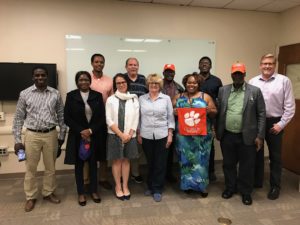Last week, a delegation from Zambia’s Copperbelt University and its Governing Council visited Clemson University to broaden the scope of their existing relationship and explore new opportunities to work together in the future.

The visit reciprocated a trip to Zambia last February from Parks, Recreation and Tourism Management Department (PRTM) Chair Wayne Freimund and PRTM faculty members for similar discussions.
“Our university management made a decision that this is the right time to visit, so we can show our colleagues that we appreciate the relationship, and would like to find ways to entrench and strengthen it through new areas of collaboration,” says Dr. Jacob Mwitwa, who spearheaded the trip.
The delegates met with several different parts of the university during their two-day stay, learning more about Clemson University’s land grant mission, its existing research in Africa and academic and research work of interest to the delegation, including agricultural and natural resource programs and the university’s greenhouses, packaging and agricultural science laboratory facilities, the Clemson Experimental Forest and the School of Architecture.

“Although we already have a successful partnership with these universities, and have already done a substantial amount of work and research together, our focus has largely been on parks, recreation and tourism,” says Freimund. “The delegation’s visit creates an invaluable opportunity to expand what has been a successful and enriching partnership for everyone involved to other parts of the university, creating a more fulsome array of potential projects in the future.”
Mwitwa says that international partnerships between academic institutions are increasingly important, as many major issues require a global lens. “If someone is teaching about international development, conservation, tourism or climate change, a primary focus of your work is going to be with other countries,” he says. “Although it’s important to understand science from a local perspective, having a global perspective enriches the conversation. After all, science doesn’t have political boundaries.”
